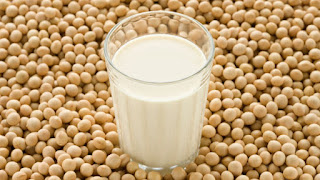Soy milk contains many nutrients that the human body needs. In addition, the content of protein in soy milk is equivalent to cow's milk so can be an alternative, especially if you experience any problems of lactose intolerance or cow's milk allergy. Its content of soy milk actually much richer than cow milk. In infants or young children, soy milk can also be used as the best alternative to replace the formula that tends to contain bacteria that can harm health. Benefits and content of soy milk include proteins, carbohydrates, fats, fiber, essential vitamins and minerals.
Protein content of soy milk in handy to enhance the body immunity, for growth and to repair tissue, as well. Content of soy protein in milk is composed of a number of amino acids such as lecithin, lysine, niacin, leucine, threonine, isoleucine, tryptophan, phenylalanine, arginine and glycine. The last two amino acid is a constituent component of the hormone insulin and glukogen released by the pancreas gland in the body.
Fats, carbohydrates, and fiber / fiber that are in the content of soy milk are very good for human body because it can be a source of energy and also facilitate the digestive system. While the essential vitamins contained in the content of soy milk is vitamin A (which in soy bean derived from carotene) to help the smooth functioning of the vision and bone growth, vitamin B1, which was instrumental in generating energy, vitamin B2 (many contained in the milk, either cow's milk, soy milk and breast milk), Vitamin E is known to be useful to streamline the process of reproduction, the process of menstruation, increased milk production and to prevent miscarriage, impotence, heart disease and cardiovascular.
In addition, the mineral content of soya milk useful in strengthening bones and teeth and enhance body immunity against diseases.
In the content of soy milk there is also a useful polysaccharides suppress glucose and triglyceride levels that consuming soy milk is very good for diabetics to help control blood sugar levels are high. The content of soy milk the most famous is the isoflavones, which some amino acids in soybean seeds that bind to each other plus some vitamins and other nutrients and the form of flavonoids. Unpleasant odor characteristic of soybean milk actually comes from these flavonoids. Scientifically, flavonoids shown to prevent also treat various diseases. Content of isoflavones in soy milk is very beneficial to unleash metabolism and digestion, enhance immunity, strengthen the bone structure, stabilize blood pressure and blood sugar, reduce levels of bad cholesterol, prevent obesity, and reduce the symptoms of various diseases such as kidney, heart disease, stroke, acid veins, arthritis, ulcers and even reduce the symptoms of menopause.
So much content of soy milk are known to be extremely beneficial to the health of our body so that the soy milk become so popular. The only drawback is the smell of soy milk in some people considered bad. But now the market has available unsweetened soy milk and natural food flavorings. If you do not like the smell typical of pure soy milk, you can eat with strawberry-flavored soy milk, pandanus, ginger, chocolate, vanilla, etc.
Protein content of soy milk in handy to enhance the body immunity, for growth and to repair tissue, as well. Content of soy protein in milk is composed of a number of amino acids such as lecithin, lysine, niacin, leucine, threonine, isoleucine, tryptophan, phenylalanine, arginine and glycine. The last two amino acid is a constituent component of the hormone insulin and glukogen released by the pancreas gland in the body.
Fats, carbohydrates, and fiber / fiber that are in the content of soy milk are very good for human body because it can be a source of energy and also facilitate the digestive system. While the essential vitamins contained in the content of soy milk is vitamin A (which in soy bean derived from carotene) to help the smooth functioning of the vision and bone growth, vitamin B1, which was instrumental in generating energy, vitamin B2 (many contained in the milk, either cow's milk, soy milk and breast milk), Vitamin E is known to be useful to streamline the process of reproduction, the process of menstruation, increased milk production and to prevent miscarriage, impotence, heart disease and cardiovascular.
In addition, the mineral content of soya milk useful in strengthening bones and teeth and enhance body immunity against diseases.
In the content of soy milk there is also a useful polysaccharides suppress glucose and triglyceride levels that consuming soy milk is very good for diabetics to help control blood sugar levels are high. The content of soy milk the most famous is the isoflavones, which some amino acids in soybean seeds that bind to each other plus some vitamins and other nutrients and the form of flavonoids. Unpleasant odor characteristic of soybean milk actually comes from these flavonoids. Scientifically, flavonoids shown to prevent also treat various diseases. Content of isoflavones in soy milk is very beneficial to unleash metabolism and digestion, enhance immunity, strengthen the bone structure, stabilize blood pressure and blood sugar, reduce levels of bad cholesterol, prevent obesity, and reduce the symptoms of various diseases such as kidney, heart disease, stroke, acid veins, arthritis, ulcers and even reduce the symptoms of menopause.
So much content of soy milk are known to be extremely beneficial to the health of our body so that the soy milk become so popular. The only drawback is the smell of soy milk in some people considered bad. But now the market has available unsweetened soy milk and natural food flavorings. If you do not like the smell typical of pure soy milk, you can eat with strawberry-flavored soy milk, pandanus, ginger, chocolate, vanilla, etc.




0 comments:
Post a Comment